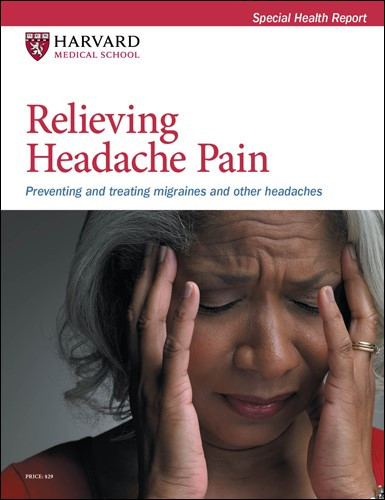Living with chronic headache: A personal migraine story
ARCHIVED CONTENT: As a service to our readers, Harvard Health Publishing provides access to our library of archived content. Please note the date each article was posted or last reviewed. No content on this site, regardless of date, should ever be used as a substitute for direct medical advice from your doctor or other qualified clinician.

As I write this, a dull headache presses into the space above my left eye. The same headache visited me yesterday, and the day before that. In fact, for most of the last year, I’ve had a headache every day, all day. Though it’s now manageable — I can write with it, after all — for the previous 12 months, my headaches took over my life. They were all I thought about. They became who I was.
On the good days, the pain was just a mild throbbing sensation. Other times, there was a general sense of an ever-tightening pressure. On the days when I couldn’t get out of bed, it felt like someone was tightening screws into the sides of my head and pounding a hammer above my left eye. The pain never went away, unless I was asleep. So I slept a lot, as much as my body would let me.
I’ve always gotten more headaches than the average person — the mild, treat-with-an-over-the counter-pain-medication-and-they’ll-go-away type. But following a drawn-out viral infection that left me sneezing and feeling run-down for weeks, I started to get headaches every day, and they were more painful than usual.
A few months later, on top of those daily headaches, I developed occipital neuralgia, a distinct type of headache that causes electric shock-like pain in the upper neck and behind the ears. Eventually, I became extremely sensitive to light. At that point my doctor suspected my condition had transformed into a daily migraine (with a side order of occipital neuralgia).
As the pain varied, so did my moods and reactions to it. When the pain was at its worst, I felt like I would go crazy if I had to deal with it for one more minute. I spent most of one particularly bad month in bed, crying. I worried that I would never get better. I couldn’t think straight, let alone do any of the things I loved, like gardening or hiking with my husband and our dog. I also cut my hours at work.
As a result of all these changes, I lost my sense of self — by far the scariest part of being sick. I couldn’t remember who I was or what I liked to do, couldn’t remember talking about anything other than illness and treatments. In those darkest moments, staring at my dog helped. It was as if she, who didn’t need me to say anything or be anyone in particular, could accept this broken-down me even when I couldn’t.
I’m finally starting to experience some relief. I’m on a medley of medications, the side effect of which has mostly been severe fatigue. But as annoying as it is to be falling asleep by 9 pm, I’ll trade that for constant migraines — hands down. I’m also doing physical therapy and getting massages to ease tension in my neck and shoulders. My insurance doesn’t pay for those treatments, but again, not feeling that awful pain is worth the out-of-pocket expense.
Aside from talking to my dog, a few other things helped me cope. If you’re dealing with chronic headaches or persistent pain of any sort, maybe they’ll help you, too:
- Find the right doctor. It took me a few tries to find a neurologist I liked and trusted (and who returned my calls between appointments, which is important when you’re starting new medications and have questions once you start taking them). It was then that my headaches started to get better.
- Have someone to talk to. I was able to talk to my husband about what I was going through. He had a bout of bad back pain a few years ago, so he understood much of my fear and frustration. If I hadn’t had him to talk with, I probably would’ve turned to a support group, either in person or online.
- Lighten your load. I gave up a lot of the things I did before I got sick. My husband took over just about all our household duties. And as I mentioned, I worked part-time during the worst of things. This can be difficult psychologically, but it can also be necessary.
- Keep your mind occupied. While I lay in bed, I found podcasts and books on tape to keep me entertained. I also got a tai chi DVD to help me move around a little when I got sick of lying down.
At this point, I experience stretches of time when I don’t have a headache. They feel like miracles. And even when I do have a headache, it’s usually a minor, manageable one. Now that I feel the treatment is working — and that I’ve found a doctor who is helping me — I’m able to sustain hope that my headache-free times will expand, until eventually they take over whole days, then weeks, then months, then…
(A version of this essay was first published in Headache Relief, a Special Health Report from Harvard Health Publishing. This is an excellent resource for headache sufferers. It describes the various types of headaches, their treatments, and self-help and alternative therapies.)
Adapted from a Harvard Health Blog post by Christine Junge.
About the Author

Harvard Health Publishing Staff
Disclaimer:
As a service to our readers, Harvard Health Publishing provides access to our library of archived content. Please note the date of last review or update on all articles.
No content on this site, regardless of date, should ever be used as a substitute for direct medical advice from your doctor or other qualified clinician.
















